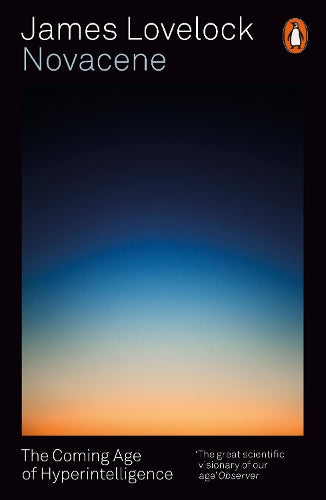Novacene

Ratings/reviews counts are updated frequently.
Check link for latest rating. ( 2,421 ratings, 324 reviews)Read More
Found a better price? Request a price match

Novacene
Book Hero Magic created this recommendation. While it's new and still learning, it may not be perfect - your feedback is welcome! IS THIS YOUR NEXT READ?
Novacene
Novacene by James Lovelock provides a fascinating exploration into the future of life on Earth from the mind of a preeminent scientific visionary. At the heart of the book lies Lovelock's revolutionary theory that the Anthropocene era—characterised by human dominance through planetary-scale technologies—is drawing to a close. In its place, Lovelock introduces the concept of the Novacene, a new epoch poised to redefine our existence.
Central to this transformative age is the emergence of beings derived from current artificial intelligence systems. These entities, Lovelock posits, will think at speeds 10,000 times faster than humans. However, contrary to the dystopian scenarios often proposed by science fiction, these hyper-intelligent beings will not seek to dominate or destroy us. Instead, they will recognise a symbiotic relationship with organic life, understanding that Earth's ecological health is integral to their own survival.
Lovelock argues that such beings would rely on Gaia, the planetary cooling system, to mitigate the increasing heat from the sun. Gaia, in turn, is sustained by organic life forms, fostering a unique partnership where both humans and these advanced beings must work together. This collaborative relationship is crucial in ensuring that Earth's intelligence not only survives but thrives in the face of escalating environmental challenges.
At 100 years of age, Lovelock presents us with one of his most compelling works. Novacene is not merely a contemplation of future technologies but an urgent call to recognise our role in a broader cosmic narrative. As the only current beings capable of understanding the cosmos, humans stand at a pivotal juncture. Lovelock speculates that this new age could signify the dawn of intelligence suffusing the entire universe, a profound shift in our understanding of life and its potential reach.
Rich with insight and visionary foresight, Novacene offers readers an extraordinary perspective on our future, urging us to embrace our role as custodians of Earth's intelligence. Lovelock’s latest work challenges us to think beyond human scales and consider the larger, planetary consequences of our actions, making it an essential read for anyone interested in the fate of our planet and the broader cosmos.
Book Hero Magic summarised reviews for this book. While it's new and still learning, it may not be perfect - your feedback is welcome! HOW HAS THIS BEEN REVIEWED?
Novacene is praised for its clear and beautifully explained hard science, its mischievous wit, and its bracingly corrective nature. Described as restlessly thoughtful and forward-looking, the book defends Lovelock's lifetime ideas and argues about the future impact of AI on humanity. The work is noted for being both witty and optimistic, encapsulating the wisdom of an elder, making it highly rewarding despite its brevity. Lovelock's persuasive writing style is highlighted, with the book offering a compelling insight into hyperintelligence.

Book Details
INFORMATION
ISBN: 9780141990798
Publisher: Penguin Books Ltd
Format: Paperback / softback
Date Published: 30 July 2020
Country: United Kingdom
Imprint: Penguin Books Ltd
Audience: General / adult, Tertiary education, Professional and scholarly
DIMENSIONS
Spine width: 8.0mm
Width: 129.0mm
Height: 198.0mm
Weight: 123g
Pages: 160
About the Author
James Lovelock, who was elected a Fellow of the Royal Society in 1974, is the author of more than 200 scientific papers and the originator of the Gaia Hypothesis (now Gaia Theory). His many books on the subject include Gaia- A New Look at Life on Earth (1979), The Revenge of Gaia (2006), The Vanishing Face of Gaia (2009) and A Rough Ride to the Future (2014). In 2003 he was made a Companion of Honour and in 2005 Prospect magazine named him one of the world's top 100 public intellectuals, and in 2006 he received the Wollaston Medal, the highest Award of the UK Geological Society.
Also by James Lovelock
View allMore from Science & Nature
View allWhy buy from us?
Book Hero is not a chain store or big box retailer. We're an independent 100% NZ-owned business on a mission to help more Kiwis rediscover a love of books and reading!

Service & Delivery
Our warehouse in Auckland holds over 80,000 books and puzzles in-stock so you're not waiting for your order to arrive from overseas.

Auckland Bookstore
We're primarily an online store, but for your convenience you can pick up your order for free from our bookstore, which is right next door to our warehouse in Hobsonville.

Our Gifting Service
Books make wonderful thoughtful gifts and we're here to help with gift-wrapping and cards. We can even send your gift directly to your loved one.























